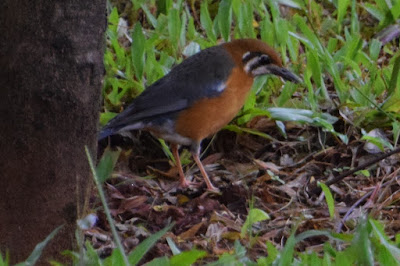Last weekend, along with the rest of Pune, we decided to
take a trip out. We decided to go to Malshej Ghat and surrounding areas. There
were no Hotel bookings available but our young and restless companions were in
no mood to waste a perfect monsoon weekend in Pune. So off we went very early
in the morning thinking we will barely be able to cover Malshej Ghat some 130
kms from Pune compounded by the weekend traffic. But along the way the GPS lady
and the local people all pointed us towards Ozar and we found ourselves taking
a left turn at Narayangaon and lo and behold we were meandering through scenic
village roads to Ozar. We had an interesting time identifying the various crops growing
on both sides of the narrow road. But it definitely seemed like an onion belt
which had been harvested and lying in big metal storage cages.
OZAR
During the monsoons the rough and rugged terrain of
Maharashtra gets a coat of different shades of green and with its outline of
hills with laden clouds wafting on top, it is a sight for sore eyes. Within four
hours we were in Ozar despite a breakfast halt at the Kamat Restaurant in
Khed. Rajeev impressed us by remembering
the route even after some 6-7 years, but the smoothness with which places not
on our itinerary were falling in place, all of us agreed our route was
predestined.
The swayambhu ( self-emanated) Vighneswara temple at Ozar is
part of the Ashtavinayak circuit that people in Maharashtra undertake as a
pilgrimage. Ganesha is worshipped here as the benevolent remover of obstacles.
It is said that Vighnasura, a demon, was wreaking havoc generally and
particularly harassing King Abhinandana who was trying to perform a yagya or
sacrificial fire. He prayed to the Gods for help and Ganesha fought and
defeated the demon and got the name VIGHNESHWARA. Vighn in Sanskrit means
obstacles and it is common belief amongst the Hindus that before undertaking
any major activity one seeks the blessings of the benevolent Vighneshwara, the
remover of obstacles. So after offering our oblations to Vighneshwara the successful
completion of our journey was guaranteed.
 |
| Our Breakfast halt |
LENYADRI (mountain cave)
We knew about the Lenyadri caves which date back to the 1st
century AD, but we were not aware that another of the Ashtavinayaks was housed
in one of the caves. Just about 15 km from Ozar the road sign beckoned us to
make the trip. So off we went seeing the Divine hand in everything. However,
when we got out of the car we saw a serpentine line of people laboriously
climbing up some 300 rocky steps and the euphoria quickly came down. I was all
prepared to bide my time in the colourful little market which sprouts up around
all temples in India selling the same kind of trinkets, while the others
clambered up. But Chetali would hear none of it and persuaded me to attempt it
or sit in one of the palkis and be carried by four men up the hill. Obviously I
climbed up without much difficulty and the faith was renewed.
These are Hinayana Buddhist caves but cave number 7 houses
Ganapati, a Hindu god. Here he is worshipped as Girijatmaj (son of Parvati).
 |
| A serpentine climb up hill to the Lenyadri caves |
 |
| Palki carrying the infirm |
 |
| Colourful Temple market |
 |
| "KAPICHITA" one name of these hills means "favourite of the monkeys" |
Chetali carried a packet of sweets and roasted chickpeas to offer as prasad to the God, swinging the packet in her hand with typical youthful abandon. I told her if she is not careful Hanuman and not Ganesh will be the recipient of it and sure enough a monkey with a tiny baby snatched the packet from her.
 |
| The last chickpea being polished off |
 |
| ''Kand Mool" or ''Ram Kand" this is what the sanyasis in the forests survived on. Tastes sweet and crisp |
The sight of this thing which looked like a unfinished Indian drum or a "dholak'' made us run to the guy selling thin slices of it and flood him with questions. He just told us the name Kand-mul and nothing else. I remembered in childhood I used to read a kids' magazine called "Chandamama" which was replete with stories of ascetics and rishis living in forests and surviving on "kand-mul''. I used to think that was a generic name for all things they dug up to eat. Apparently there is something actually called that.
MALSHEJ GHAT
We made a valiant effort to see the Shivneri Fort on the
way, where Shivaji was born but the weekend crowds meant we couldn’t drive up
to the top. After the 300 odd steps climb at Lenyadri nobody fancied a uphill
trek of at least a couple of kms, except our young friend Kuldeep, who was
vociferously outvoted. So we drove some 30 km through some mesmerizing landscape
to the MTDC guest house for our evening tea but the crowds of tourists proved a
dampener and we just enjoyed the sight of the rising mist and the distant
waterfalls while sipping hot tea at a stall within the premises and then drove
on to explore the waterfalls up close. The chilly breeze kept us from getting
under the waterfall so we did the next best thing – took the car under one!
All in all we thoroughly enjoyed ourselves specially
birthday boy Rajeev who had a cake waiting for him at home, sent by Chetali’s
dad, to cut.
 |
| Finally got a glimpse of the Angel guiding us. Rajeev swears he saw a face in this sudden effulgence that broke through the clouds. |
 |
| Kuldeep doing a Mary Poppins |
*******************************************
















































